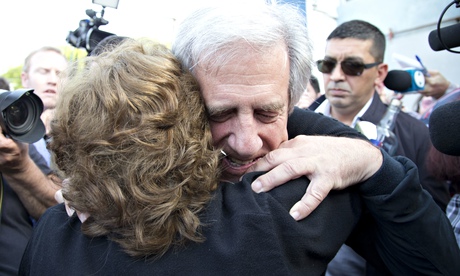by GREG GRANDIN
 Tabaré Vázquez after casting his vote in the general election, in Montevideo, Uruguay. PHOTO/Natacha Pisarenko/AP/The Guardian
Tabaré Vázquez after casting his vote in the general election, in Montevideo, Uruguay. PHOTO/Natacha Pisarenko/AP/The Guardian
Red flags are flying in Rio and Montevideo. Not only did Dilma Rousseff win in Brazil on Sunday but next door in Uruguay, Tabaré Vázquez, the presidential candidate for Frente Amplio—or Broad Front, the political heir to the insurgent Tupamaros of the 1970s—did better than expected in a first-round vote and is predicted to win a November runoff. Vázquez, a former president (Uruguay prohibits consecutive re-election) would follow the beat-up-beetle-driving, pot-, same-sex-marriage-, and abortion-legalizing, flower-growing, three-legged-dog owner, former political prisoner and renunciant incumbent, José Mujica.
In Brazil, Dilma beat back a neoliberal-technocrat challenge. In Uruguay, Vázquez, a medical doctor, will face a more traditional conservative in November, Lacalle Pou, the son of a former right-wing president. Pou’s campaign is notable since it is among the first in Latin America to bet the bank on Richard Nixon–style wedge issues, hoping to use abortion, drugs and crime to take power. Reuters reports this from a Pou supporter: “?‘So we are killing babies now and the state will sell marijuana,’ said Adriana Herrera, a 68-year-old pensioner. ‘My frustration is not just with the handout policies but also with the laws that have been approved that are terrible for the country.’?” The nice use of the word pensioner here transports us back to the salad days of the New Right, to Margaret Thatcher’s kitschy shopkeeper authoritarian conservatism. Pou also promises tax cuts. He lost, and early polls expect he will lose the runoff. But he did get a third of the vote.
Hugo Chávez was first elected in Venezuela in 1998, which means we are more than a decade and a half into Latin America’s “left turn.” With these votes in Brazil and Uruguay, along with the recent re-elections of Michelle Bachelet in Chile, Rafael Correa in Ecuador and Evo Morales in Bolivia, the developmentalist social-welfare left—both its “moderate” and “populist” wings—is showing remarkable endurance, having moved on from its first generation of leaders, Chávez, Kirchner in Argentina and Lula in Brazil.
The Nation for more
